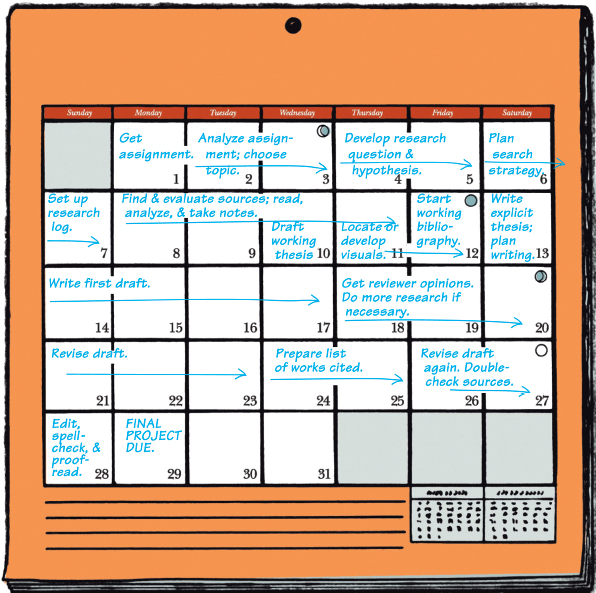10b Analyzing the assignment
Contents:
Considering requirements and limits
Considering the rhetorical situation
Choosing a topic
For an introductory writing course, David Craig (whose final project appears in 32e) received the following assignment:
Choose a subject of interest to you, and use it as the basis for a research essay of approximately 2,500 words that makes and substantiates a claim. You should use a minimum of five sources, including at least three scholarly sources.
 Considering requirements and limits
Considering requirements and limits
Before you begin any research assignment, make sure you understand what you need to do.
- How many sources should you use?
- Does your instructor require certain kinds of sources? If so, what kinds?
- What genre and medium will be appropriate for this project? Are you expected to write a traditional print essay or slide presentation? Should you consider another genre or medium, such as a Web report or video essay?
- Will you use images, sound, or video in your assignment?
- Should you work independently or collaborate with others on the project?
- What kind of documentation style does your instructor want you to use? (See the documentation section.)
- Do you understand what your instructor expects you to do? If not, ask for clarification.
 Considering the rhetorical situation
Considering the rhetorical situation
Be sure to consider the rhetorical situation of any research project.
Purpose
- Do you have a choice about the purpose of your assignment? If you can choose the purpose, what would you like to accomplish?
- What do you need to do in this project—
explain a situation? weigh opposing viewpoints and make a claim about which is correct? convince the audience to do something? explore the causes or effects of a particular phenomenon? Your purpose will affect the kinds of sources you need to find. - If you have been assigned a specific research project, keep in mind the key words in that assignment. Does the assignment ask that you describe, survey, analyze, persuade, explain, classify, compare, or contrast? What do such words mean in this field (2b)?
Audience
- Who will be the audience for your research project (2e)? Why will they be interested in the information you gather?
- What do you know about their backgrounds? What assumptions might they hold about the topic? What do they already know, and what do they need to know?
- What genre and medium will be the best way to reach your audience (2f)?
- What response do you want to elicit from them?
- What kinds of evidence will you need to convince them?
- What will your instructor expect?
Rhetorical stance
What is your attitude or stance toward your topic (2d)? Are you curious about it? critical of it? Do you like it? dislike it? find it confusing? What influences have shaped your stance?
Scope
How many and what kinds of sources should you use? What kinds of visuals—
Length
How long is your project supposed to be? You will need far less research and writing time for a 1,000-
Deadlines
When is the project due? Are any preliminary materials—

 Choosing a topic
Choosing a topic
If your assignment does not specify a topic, consider the following questions:
- What subjects do you already know something about? Which of them would you like to explore more fully?
- What subjects do you care about? What might you like to become an expert on?
- What subjects evoke a strong reaction from you—
intense puzzlement, skepticism, affirmation?
Be sure to get responses about your possible topic from your instructor, classmates, and friends. Ask them whether they would be interested in reading about the topic, whether it seems manageable, and whether they know of any good sources for information on the topic.
David Craig’s topic
David Craig hit on his topic one evening after spending several hours exchanging texts and messages with several friends. Like most of the people his age that he knew, David had considered texting and messaging a regular part of his writing experience for years, so he expected his classmates to find the subject intriguing. (To read his essay, see 32e.)
Talking the Talk: Reaching an audience